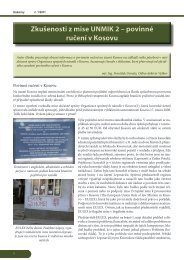TRADOC Pam 525-3-7-01 - TRADOC - U.S. Army
TRADOC Pam 525-3-7-01 - TRADOC - U.S. Army
TRADOC Pam 525-3-7-01 - TRADOC - U.S. Army
- No tags were found...
Create successful ePaper yourself
Turn your PDF publications into a flip-book with our unique Google optimized e-Paper software.
<strong>TRADOC</strong> <strong>Pam</strong> <strong>525</strong>-3-7-<strong>01</strong>changing demographics, the use of languages other than English is common. Americans aremore tolerant of other languages now, whereas assimilation was the norm in the past.Socially, “[the millennials are] the ‘Babies on Board’ of the early Reagan years, the ‘HaveYou Hugged Your Child Today?’ sixth graders of the early Clinton years, and the teencontemporaries of Columbine. They are the children of the No Child Left Behind Act of 20<strong>01</strong>and the first generation to grow up in the post 9/11 world.” 44 Their structured lives includedparents shuffling them from one activity to another all under the watchful eyes of teachers,coaches, tutors, and music instructors. Wide-ranging child protection laws and safety productsthat came out of the 1980s have made millennials one of the most sheltered generations.Consequently, they have emerged as a tolerant, pragmatic, ambitious, and optimistic group. Theybelieve themselves to be influential and unique. They are familiar with all things digital, havinggrown up immersed in computer games, MP3 players, DVDs, digital video recorders, cellphones, and the Internet. 45 Their values are not constant, but are variable according to theexigencies of the moment. Their perception of right and wrong will probably differ from theirleaders. The majority of high school students freely admit to lying, cheating, and stealing, yet seenothing wrong with their ethics and character. 46 These factors if left unchanged will have amajor impact on future recruiting and training policies.EducationEducation systems in the U.S. must continuously adapt to meet the needs of the communityand the Nation. In the future, a growing population within a complex and fluid demographicenvironment will increasingly challenge a school district’s capacity to provide resources andinnovation in developing techniques to educate its children. Factors such as migration into urbanareas in search of economic opportunity put additional demands on school systems already shortof resources and qualified teachers. Recent immigrants and first generation children speaking alanguage other than English in the home create a demand for English-as-a-second-languageinstruction that further taxes existing resources. Even well-funded suburban schools may find itdifficult to engage children accustomed to an environment of constant stimulation, starting withtelevision and video games, who may find traditional education venues dull and boring. Whenthis generation begins to serve in the military, the <strong>Army</strong> will face the challenge of training,educating, and in some cases, socializing these young adults. To absorb recruits successfullyacross the entire range of qualified candidates, the <strong>Army</strong> must be willing and able to apply themost advanced techniques of learning, training, and education, supported by the latest S&Tenhancements and augmentation. The traditional one-size-fits-all basic training and advancedindividual training programs may not be adequate to meet this challenge.This growing and diverse population has meant an increased challenge for the educationsystems of the U.S. By many measures of success, the U.S. is failing to meet the challenge. Atthe elementary level, only 72 percent of children aged 12-17 are able to perform at a levelappropriate for their age. 47 Children in poor communities fare worse. The U.S. literacy rate isdeclining. 48 Ranked against other developed countries, U.S. children do poorly in math andscience and fall at the bottom in advanced physics. 49 At the graduate level, the number of U.S.students pursuing advanced degrees in hard sciences fails to meet projected needs for those skills.A politically charged debate as to the reasons behind this failure remains unsettled, but the41



